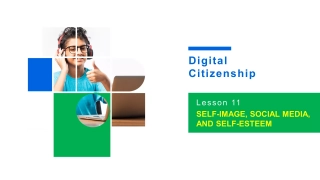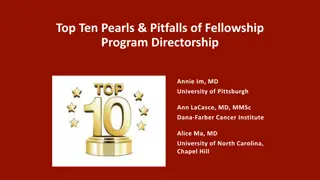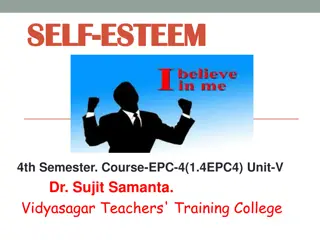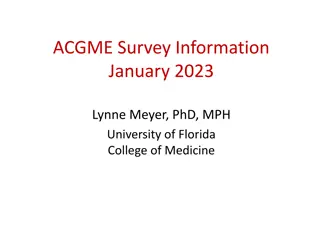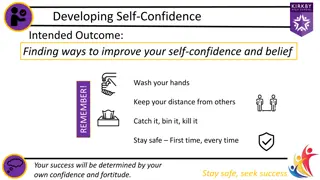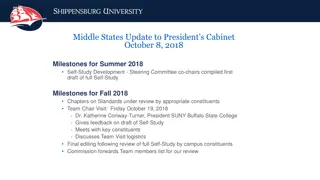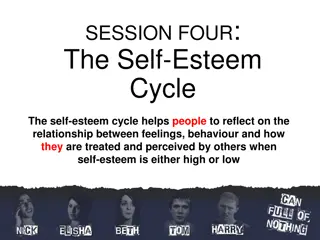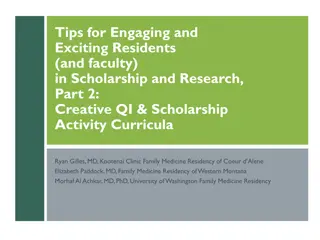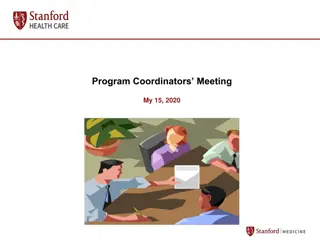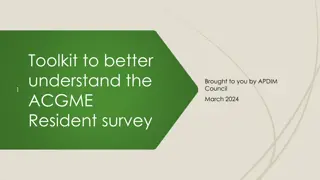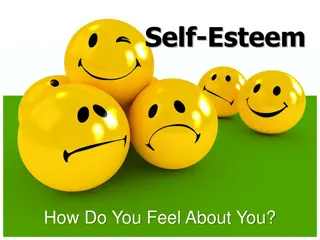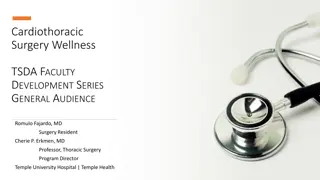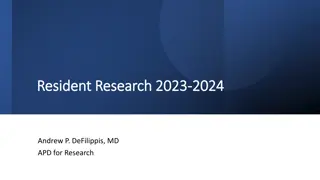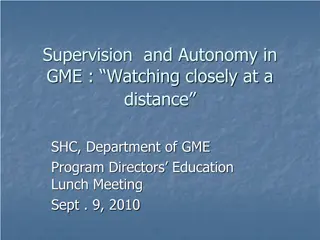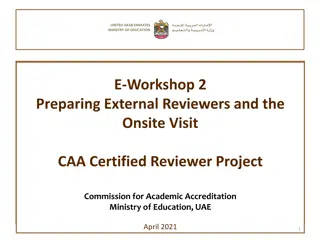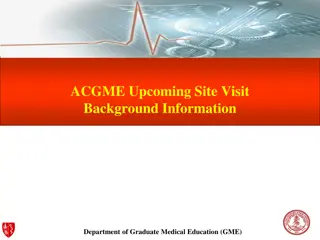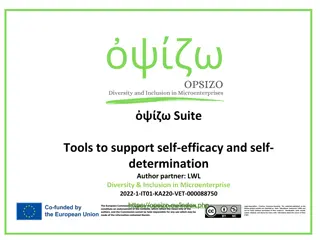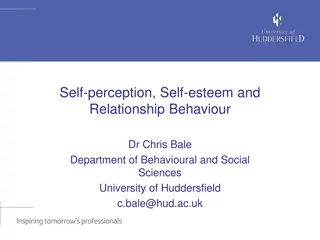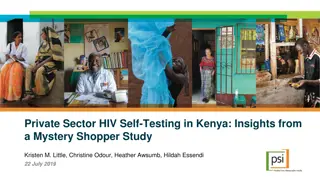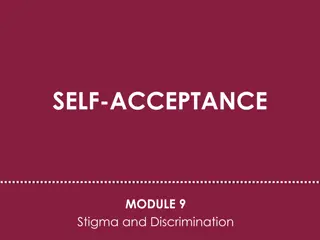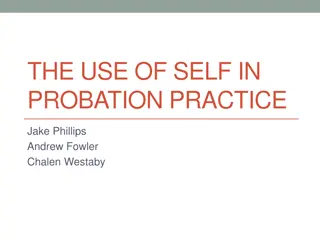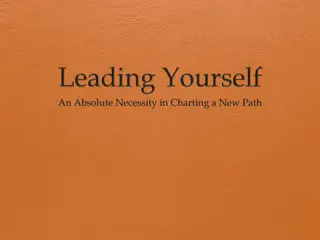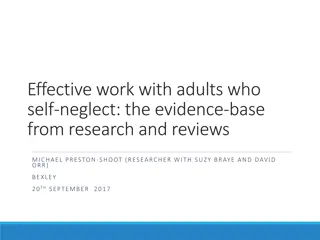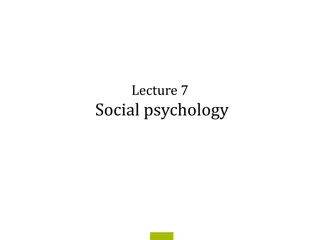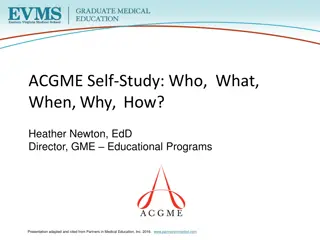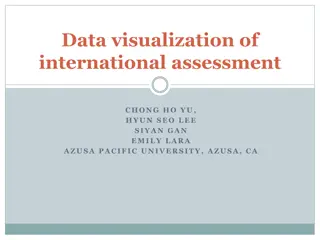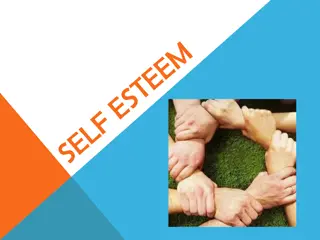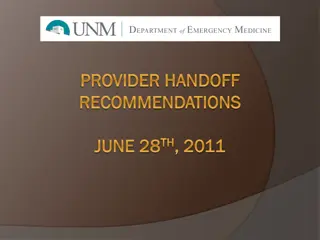Digital Citizenship: Self-Image, Social Media, and Self-Esteem
Explore the impact of social media on self-image and self-esteem. Learn about the influence of filters and media on body perception. Reflect on self-assessment and take-home activities to improve self-confidence.
3 views • 11 slides
Toolkit to better understand the ACGME Resident survey
The ACGME Resident Survey is an annual tool designed to capture residents' clinical, educational, and learning environment experiences. It aids in program accreditation and improvement by providing confidential aggregate data. Residents are encouraged to answer honestly as it does not impact program
0 views • 25 slides
Understanding Self-Worth in Children: Building a Strong Foundation
Explore the importance of self-concept, self-esteem, and self-worth in children's development. Learn how parents can positively impact a child's self-perception and self-value through nurturing experiences. Discover the key sources influencing children's self-worth and the critical role of early lif
0 views • 30 slides
Insights on Fellowship Program Directorship
Explore the top ten pearls and pitfalls of Fellowship Program Directorship, shared by accomplished professionals in the field. Gain valuable advice on managing emails, conducting face-to-face meetings, preparing for ACGME requirements, and leveraging support from the Designated Institutional Officia
0 views • 22 slides
Understanding Self-Esteem: Meaning, Importance, and Types
Self-esteem is how we perceive our worth and value. High self-esteem leads to confidence and positivity, while low self-esteem can result in self-doubt and negative emotions. Self-esteem impacts mental health, behavior, decisions, relationships, and overall success in life. Recognizing and nurturing
2 views • 15 slides
Understanding Self-Esteem and Ways to Improve It
Self-esteem is our perception of ourselves, impacting how we navigate life. Healthy self-esteem fosters positivity, while low self-esteem can be detrimental. Various factors, like childhood experiences, contribute to low self-esteem, but steps can be taken to improve it. Building positive relationsh
0 views • 14 slides
Understanding the Self: Psychology's Focus and Implications
The field of psychology has long been intrigued by the concept of self, exploring its importance to well-being, self-esteem, and brain localization. Research reveals how excessive optimism, self-bias, and blindness to incompetence can impact self-esteem. Contrasting individualist and collectivist cu
1 views • 41 slides
ACGME Survey Information January 2023 Overview
This document provides details on the ACGME survey information for January 2023, focusing on faculty, residents/fellows, survey content areas, visuals, and program comparisons. It outlines response rate requirements, survey data interpretation guidelines, and areas of evaluation like clinical experi
0 views • 8 slides
Building Self-Confidence: Key Steps and Benefits
Understanding self-confidence, its importance, and how to develop it can lead to enhanced resilience, motivation, reduced fear and anxiety, and a stronger sense of self. Self-confidence allows for confident behavior, while lack of it can lead to self-doubt and avoidance of risks. Learning to embrace
0 views • 7 slides
The Importance of Self-Awareness in Personal Growth
Self-awareness is crucial for understanding one's character, feelings, and motivations. It helps in recognizing strengths and weaknesses, managing stress, improving communication, and fostering empathy. Developing self-awareness involves introspection, mindfulness, self-reflection, and seeking feedb
2 views • 47 slides
Guide to Graduate Medical Education (GME) at Stanford Health Care
GME at Stanford Health Care sponsors over 120 ACGME residencies and fellowships, with a diverse team dedicated to supporting trainees. Communication with the office is accessible through email, phone, and in-person visits. The team members, led by Ann Dohn, offer various resources and facilities suc
0 views • 16 slides
Developing a Self-Care Action Plan for Overall Well-Being
Self-care involves deliberate activities to nurture mental, emotional, physical, and spiritual health, yet it is often neglected. This guide explores the essence of self-care, emphasizes the importance of building a personalized self-care action plan, and provides insights into taking care of your b
0 views • 19 slides
Enhancing Self-Confidence for Professional Success
Understanding the importance of self-confidence in the workplace is crucial for personal growth and career advancement. Self-confident individuals trust their abilities, maintain a sense of control over their lives, and have realistic expectations. This summary delves into the characteristics of sel
0 views • 13 slides
Middle States Commission on Higher Education Self-Study Process
The Middle States Commission on Higher Education's self-study process involves organizing the study of institutional mission, goals, and objectives through working groups, drafting the self-study report, receiving feedback, and preparing the final report for accreditation. The mission is to ensure e
1 views • 8 slides
Understanding the Self-Esteem Cycle: High vs Low Self-Esteem
The self-esteem cycle explores the interplay between one's feelings, behavior, and how they are treated based on their self-esteem level. High self-esteem is associated with positive feelings, supportive behavior, and positive interactions, while low self-esteem manifests in negative emotions, withd
9 views • 4 slides
Enhancing Engagement in Scholarly Activities and Research in Family Medicine Residency Programs
Explore strategies and challenges in promoting scholarly activities and research participation among residents and faculty in family medicine residency programs. Learn about ACGME/RRC requirements, importance of research in primary care, and creative QI and scholarship curricula. Discover insights o
0 views • 25 slides
Enhancing Self-Regulation for Formative Assessment through Social and Emotional Learning
Explore the significance of self-regulation in formative assessment, understand key concepts like self-control, emotional competence, and perseverance. Discover actionable strategies to implement self-regulation interventions with students and train other adults effectively. Future orientation and s
0 views • 25 slides
Program Coordinators Meeting Agenda and Updates
The Program Coordinators Meeting covers a range of important topics including orientation, graduation events, off-boarding procedures, ACGME updates, licensing reminders, continuing appointments, and more. Details about orientation sessions, benefits, graduation event protocols, and off-boarding pro
0 views • 17 slides
Understanding Mindful Self-Judgment and Its Role in Mental Health
Mindful self-judgment is a complex concept that involves balancing self-awareness and self-compassion. While nonjudgment is a key aspect of mindfulness practices, there is a debate on whether mindful self-judgment can be appropriate and functional in certain circumstances. Researchers like June Pric
2 views • 46 slides
Understanding the ACGME Resident Survey: Insights and Guidelines
The ACGME Resident Survey is conducted annually to gather confidential data on residents' clinical and educational experiences. The survey aids in program accreditation and identifies areas for improvement. Answer honestly as it does not impact accreditation. The survey covers experiences from July
0 views • 27 slides
Understanding Self-Esteem: Highs and Lows
Self-esteem is the judgment we hold about ourselves, shaped by experiences and relationships. High self-esteem individuals embrace new encounters with confidence and positivity, while low self-esteem individuals struggle with self-doubt and criticism. Recognizing signs of low self-esteem is crucial
0 views • 11 slides
Physician Wellness and Burnout in Cardiothoracic Surgery: Addressing Challenges and Strategies
Understanding the impact of physician wellness and burnout in cardiothoracic surgery is crucial for providing the best care to patients. This content explores scenarios related to burnout, addresses responsibilities at various levels, and emphasizes the importance of creating a supportive environmen
0 views • 29 slides
Enhancing Self-Regulation Skills in Children: Strategies and Tips
Understanding and fostering self-regulation in children is crucial for their development. Self-regulation involves controlling impulses, focusing, and shifting between tasks. This article delves into the internal mechanisms of self-regulation, such as executive function, and provides practical tips
1 views • 22 slides
Resident Research Opportunities During Residency
Explore the benefits of engaging in research during residency, including gaining new experiences, working independently on projects of interest, meeting ACGME requirements, and enhancing fellowship applications. Key steps include meeting with research liaisons, identifying mentors, topic selection,
0 views • 9 slides
Importance of Supervision and Autonomy in Graduate Medical Education
The discussion tackles the crucial aspect of supervision in Graduate Medical Education (GME), emphasizing the significance of supervision over duty hours. It delves into defining supervision, exploring ACGME regulations, measuring supervision, and understanding resident supervision from existing lit
0 views • 35 slides
Boosting Your Child's Self-Esteem & Confidence in Parenting Workshop Series
Understanding self-esteem in children is crucial for their emotional development. Healthy self-esteem leads to positive behaviors, while low self-esteem can result in negative self-perceptions. Recognizing signs of healthy and unhealthy self-esteem allows parents to support and nurture their child's
0 views • 11 slides
Enhancing Academic Accreditation Process: Onsite Visit and Self-Study Analysis
The e-workshop sessions focus on preparing external reviewers, analyzing self-study documents, and understanding the purpose of onsite visits in academic accreditation. Topics covered include self-study definition, evaluating weaknesses identified by reviewers, and the importance of the onsite visit
0 views • 16 slides
ACGME Site Visit Information for Graduate Medical Education Programs
Explore the upcoming site visit background information for Graduate Medical Education (GME) programs by ACGME, focusing on allergy & immunology programs. Learn about the roles of site visitors, requirements for program accreditation, and the use of survey data to enhance program quality and complian
0 views • 14 slides
Enhancing Self-Efficacy and Self-Determination in the Workplace
Establishing high levels of self-efficacy and self-determination in the workplace is crucial for accomplishing tasks and goals effectively. This publication explores the significance of these traits, providing strategies for managers to foster and maintain them. Discover why self-efficacy and self-d
0 views • 8 slides
Understanding Self-Perception, Self-Esteem, and Relationship Behavior
The discussion explores the impact of low self-esteem on various psychological issues, societal views on self-worth, self-perception biases, and the consequences of self-esteem in different aspects of life, backed by research and theories such as the Better-Than-Average Effect and Sociometer Theory.
0 views • 19 slides
Insights into Private Sector HIV Self-Testing in Kenya
A mystery shopper study was conducted to assess the private sector's effectiveness in providing high-quality HIV self-testing services to adolescents and young people in Kenya. The study focused on pharmacies and private health facilities participating in an HIV self-testing demonstration project. M
0 views • 25 slides
Understanding Self-Acceptance and Overcoming Stigma
Self-esteem and self-acceptance are distinct concepts, with self-acceptance focusing on embracing all facets of oneself unconditionally. Developing self-acceptance involves stages like aversion, curiosity, tolerance, and allowing. Overcoming avoidance and resistance can lead to self-compassion and g
0 views • 10 slides
The Use of Self in Probation Practice: Understanding Self-Disclosure and Its Implications
Explore the concept of self-disclosure in probation practice, examining different methods, findings, and implications. Discover the two schools of thought regarding self-disclosure and delve into the various realms and subtypes of self-disclosure practices. Gain insights into the forms of self-discl
0 views • 25 slides
Understanding Leadership and Self-Leadership for Personal Development
Leadership is defined as an influence relationship between leaders and followers striving for real change. It involves self-awareness, self-management, and self-development. Self-leadership begins with understanding oneself, motives, and capabilities through self-awareness, ultimately leading to pur
0 views • 42 slides
Understanding Self-Neglect in Adults: Challenges and Research Insights
This content delves into the complex issue of self-neglect in adults, covering its definition, key challenges, and the research evidence available. It explores the various aspects of self-neglect, including neglect of self-care, domestic environment, and refusal of services. The challenges associate
0 views • 39 slides
Understanding the Self in Social Psychology
Delve into the concept of the individual and the self in social psychology, exploring how identities have evolved historically and the distinction between collective and individual selves. Learn about self-awareness, Wundt's differentiation of I and me, and Higgins' self-discrepancy theory, shedding
0 views • 84 slides
ACGME Self-Study: Process, Purpose, and Implementation
Explore the rationale and process behind ACGME self-study initiatives, emphasizing improvement, community analysis, and goal-setting. Learn how to conduct a self-study, from forming committees to final submission, with a sample timeline and focus on SWOT analysis.
0 views • 21 slides
Correlation Between Self-Efficacy and Test Performance Based on International Assessment Data
Explore the correlation between self-efficacy, readiness to learn, intrinsic and extrinsic motivation with test performance using data from international assessments like PISA and PIAAC. Learn about the limitations of linear models in psychological research and the debate around self-efficacy accord
0 views • 32 slides
Boosting Self-Esteem: Benefits and Tips for Improvement
Understanding self-esteem, its benefits, and risks of low self-esteem are essential for personal growth. Developing high self-esteem can lead to increased self-respect, goal achievement, and willingness to try new things. On the other hand, low self-esteem can make individuals vulnerable to peer pre
0 views • 10 slides
Improving Handoff Processes in Healthcare Residency Programs
A detailed exploration of the need for effective handoff processes in healthcare residency programs to enhance patient safety and care continuity. The study highlights dissatisfaction among residents and faculty regarding the current handoff system, leading to negative patient outcomes. It discusses
0 views • 14 slides
